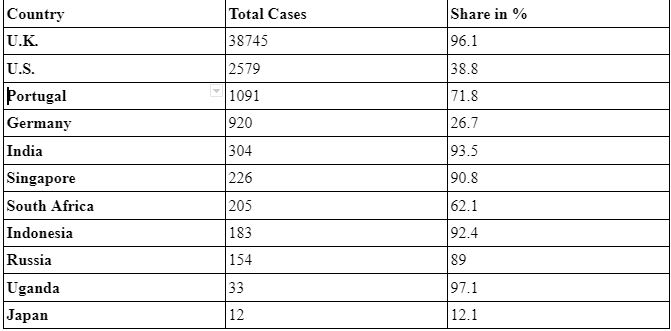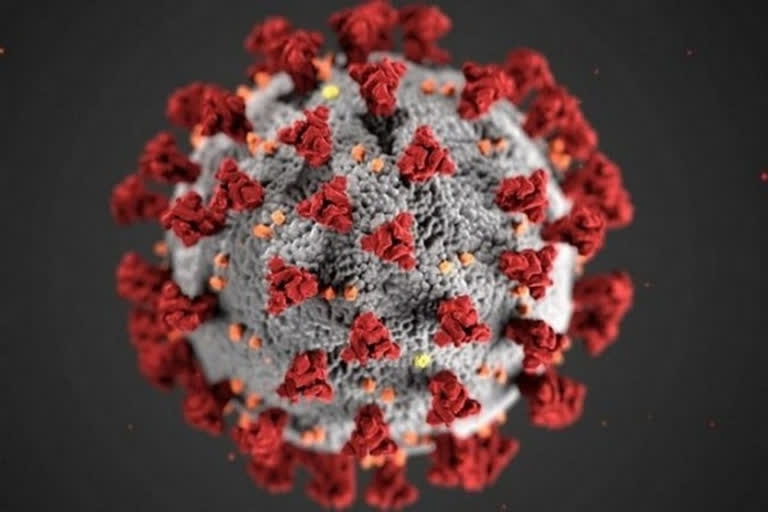Hyderabad: With two new strains of Covid-19 variants being discovered, scientists all over the world are working on detecting the variants of Covid-19. As Viruses are microscopic parasites they can’t survive for long outside the body of a host animal. As living organisms, they are much smaller than bacteria – the poliovirus, for example, is 10,000 times smaller than a grain of salt. But they do have their own DNA or RNA (Deoxyribonucleic acid and Ribonucleic acid), the building blocks of life. This allows them to mutate into new forms. In the case of SARS-CoV-2, the virus that causes COVID-19, scientists have so far identified four variants that have been classified as being of concern because they spread more easily, are more virulent or resistant to vaccines.
How was the Alpha variant discovered?
The UK or Alpha variant of the COVID-19 virus was first seen in Kent, southeast England, in September 2020. Dr Meera Chand was one of the epidemiologists monitoring the situation. So a team including specialists was quickly assembled to study the characteristics of the Kent samples. But they had a problem. Not enough samples had undergone full genome sequencing. Help came from an unexpected quarter. Staff at local ‘lighthouse’ labs, where thousands of samples a day are tested, noticed a problem. Their tests were failing to pick up a gene that they expected to see. In fact, the missing gene turned out to be characteristic of the new variant.

“Initially they thought there was an issue with the test. It wasn’t working, and the rate at which it wasn’t working was increasing very steeply,” said Dr Chand. “Identifying cases through the lighthouse labs was a huge leap ahead.”Not least because whole-genome sequencing takes time, and it quickly became clear that the new variant was spreading rapidly.
Are all mutations dangerous?
The U.S. Centers for Disease Control and Prevention (CDC) defines mutations as “changes in the genetic code of a virus that naturally occur over time when an animal or person is infected”.
Do vaccines protect against variants?
“The good news is that all of the WHO emergency use-listed vaccines do protect against developing severe disease, hospitalization and death due to the Delta variant,” said Dr Soumya Swaminathan, the World Health Organization’s chief scientist, on 1 July. The World Economic Forum has set up the COVID Action Platform to coordinate the efforts of business and other stakeholders to minimize the impact of the pandemic on public health and limit its potential for further disruption to lives and economies around the world. The Forum is also using its UPLINK innovation crowdsourcing platform to generate new ideas for actionable, scalable solutions to the challenges posed by COVID-19, including an artificial intelligence app to monitor COVID-19 infections remotely.
Data platform GISAID--shows how critical the situation in Portugal is at the moment. The Portuguese health department registered almost 1,100 infections with the dangerous Delta variant in the past four weeks, the third-highest in an analysis of 80 countries and territories. This corresponds to almost 72 per cent of all infections during this time period. Only the UK – where the Delta variety has been spreading for months – and the U.S. counted more infections with the variant over this time period.
The two countries - together with India, where the mutation was first detected – have seen the most infections with the Delta variant in total. But while it still accounts for almost all infections in India and the UK, the Delta variant’s share was only at around 39 per cent for the United States. Other countries with a high share of the Delta variant among new infections included Singapore, Russia, Indonesia and Uganda, where a ferocious coronavirus outbreak is currently underway. In the capital Kampala, lack of oxygen led to the reported death of all 30 COVID-19 patients in the country’s largest hospital on June 17. South Africa has also re-tightened restrictions as the Delta variant is also making headway here.


